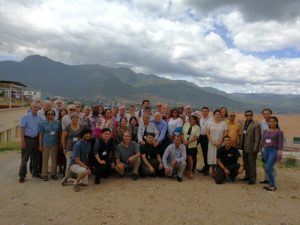UPDATE. The World Bank Inspection Panel has accepted a request from project affected Kosovaars to investigate the harms to them reported in The Downing Report. Bank Management has responded and we await the Panel’s findings and report to the World Bank Board.
The Government of Kosovo is taking preparatory actions to involuntarily displace over 7000 people to make way for an open pit lignite mine as part of the Kosovo Power Project (KPP). Kosovo Civil Society (KOSID) invited INDR President Theodore Downing to determine whether this preparation complies with the international involuntary resettlement standards (OP 4.12, PS5, PR5, OECD, and Equator Principles) that must be met for the project to obtain international financing? This report finds it does not. The report was the basis for a formal complaint to The Inspection Panel from who were and will be displaced. The Inspection Panel who recommended a full investigation to The World Bank Board. The Board approved and the Panel’s formal investigation has begun.
Downing found that World Bank Management misdirected the Kosovo agencies and lawmakers into preparing a non-compliant legal, policy, and institutional scaffolding to guide the anticipated displacement.2 The Government willingly complied. Multiple mistakes were and continue to be made.
First, as prerequisite for their Board’s approval, The Bank’s Operational Policy on Involuntary Resettlement (OP 4.12) requires a resettlement plan. In very limited situations, this due diligence may be relaxed and substituted with an abbreviated, resettlement policy framework. This shortcut is not applicable and a resettlement plan for the entire displacement is not being prepared. Second, the preparation overestimated the institutional capacities of the Government. Third, the preparations fail to align the project with the international policy’s prime objectives of assuring involuntary resettlement is a development project, with livelihood restoration, benefit sharing, meaningful consultation and participation. Fourth, lacking focus on the primary objectives, the costs of involuntary resettlement are seriously miscalculated and underestimated, raising investment costs, thereby delaying the profitability phase of the overall KPP. Prudent applicants for the private concessionaire, financiers, government, civil sector and those threatened with displacement should request a recalculation of a fully compliant involuntary resettlement component for the lifespan of the project. These costs should be folded into a revision of the projects’ overall investment costs.
Fifth, the uncertain structure of project financing also creates downstream, political risks for the government, planting the seeds that will exacerbate existing civil discord and political unrest. Costs overruns to complete the resettlement will be paid out of rate increases, not by government or the private concessionaire, leading to future conflicts between Kosovo electrical ratepayers and those being displaced.
Sixth, after millions of dollars in technical assistance, this analysis shows the proposed resettlement policy framework is little more than a weakly disguised, cash compensation plan that closely follows the failed patterns of the former government-owned mining company. In sum, Bank Management and Government are responsible for constructing an unreliable safeguard scaffolding that will cause delays and added costs to the KPP project. Their poor decisions have increased, rather than decreased the financial, environmental, social and health risks to Kosovars, their Government, investors and, foremost, those threatened with forced displacement.
Read the Full report: Final Draft Downing Involuntary Resettlement at KPP Report 2-14-14
Last Updated (11 October 2015)



